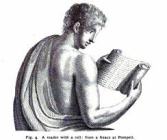Unfortunate Headlines, Strange Swords, and Blue-Backed Spellers
Leave a commentSeptember 26, 2015 by libroshombre
A friend recently gave me a delightful collection of “flubs from the nation’s press” titled “Squad Helps Dog Bite Victim.” The gaffes are from the 1970s, so they include a photo of Hubert Humphrey juxtaposed with “Argentina’s Junta Picks Obscure Army Man as President,” and headlines like “Mrs. Gandhi Stoned at Rally in India,” and “Carter Plans Swell Deficit.” Some entries are more timeless, such as “Farmer Bil l Dies in the House,” and “Columnist Gets Urologist in Trouble With His Peer.” They were drawn from the Columbia Journalism Review’s feature called “the lower case,” which printed headlines “that editors probably wish they could take back.”
l Dies in the House,” and “Columnist Gets Urologist in Trouble With His Peer.” They were drawn from the Columbia Journalism Review’s feature called “the lower case,” which printed headlines “that editors probably wish they could take back.”
Some headlines are compelling, like “The British Library Is Crowdsourcing the Translation of a Mysterious 13th-Century Sword Inscription,” which came from qz.com, “a business news publication” described in The Guardian as “a fairly light operation.” The sword topic was addressed somewhat more authoritatively in a Smithsonian.com article by Danny Lewis from last month titled, “13th-Century Sword Is Giving Historians a Headache.” It describes how the Library’s celebration of the 800th anniversary of the Magna Carta’s writing includes an intriguingly inscribed s word from that time.
word from that time.
“While the sword’s design is similar to others found and depicted in illuminated manuscripts from the same period,” Lewis wrote, “it has several distinctive features, namely an inscription down the length of the blade. Written in gold wire inlaid on one side of the blade, the inscription has baffled scholars for more than a century. It appears to read “+NDXOXCHWDRGHDXORVI+” and experts believe it has religious significance … However, the language it was written in is still a mystery, making it impossible to translate.” You can view the sword at www.bl.uk and try to break the code. So far the input’s been more wacky than useful, for as Mitchell Kanor noted, “Getting information off the Internet is like taking a drink from a fire hydrant.”
“Mysterious Origins of Punctuation” was another intriguing British headline. Coming from BBC.com, it tells how a librarian brought order to the written universe by creating the first punctuation. The person in question was known as Aristophanes of Byzantium, to distinguish him from the Greek playwright of the sam e name, and he was director of the famed Alexandrian Library in 300 BCE. Back then people wrote “so that their letters ran together ‘withnospacesorpunctuation’ and without any distinction between lowercase and capitals. It was up to the reader to pick his way through this unforgiving mass of letters to discover where each word or sentence ended and the
e name, and he was director of the famed Alexandrian Library in 300 BCE. Back then people wrote “so that their letters ran together ‘withnospacesorpunctuation’ and without any distinction between lowercase and capitals. It was up to the reader to pick his way through this unforgiving mass of letters to discover where each word or sentence ended and the next began … Aristophanes’ breakthrough was to suggest that readers could annotate their documents, relieving the unbroken stream of text with dots of ink aligned with the middle, bottom, or top of each line” acting as commas, colons, and periods, respectively. “This was not quite punctuation as we know it. Aristophanes saw his marks as representing simple pauses rather than grammatical boundaries but the seed had been planted.”
next began … Aristophanes’ breakthrough was to suggest that readers could annotate their documents, relieving the unbroken stream of text with dots of ink aligned with the middle, bottom, or top of each line” acting as commas, colons, and periods, respectively. “This was not quite punctuation as we know it. Aristophanes saw his marks as representing simple pauses rather than grammatical boundaries but the seed had been planted.”
The history of American English punctuation started with Noah Webster’s “Blue-Backed spellers.” Webster, a teacher, disliked the British-oriented American schools and primers, so in the 1780s he published a three-volume set, a speller, grammar, and reader, which all had blue covers and became known as the Blue-Backed speller though its official title was “The American Spelling Book.” It “has never been out of print, and its total sales have been estimated at more than 100 million copies,” according to Dictionary.Reference.com. It “reflected his principle that spelling, grammar, and usage should be based upon the living, spoken language rather than on artificial rules.”
Spelling Book.” It “has never been out of print, and its total sales have been estimated at more than 100 million copies,” according to Dictionary.Reference.com. It “reflected his principle that spelling, grammar, and usage should be based upon the living, spoken language rather than on artificial rules.”
The book’s packed with “moral and spiritual truths” for practicing his Americanized spelling and vocabulary. Though it seems mighty dry today, at the time Webster’s approach was revolutionary “in the way he grouped words into lists according to pronunciation rather than similarities in spelling …Webster understood that children love rhymes and that t hey learned and remembered groups of words that sounded alike more easily than words with unrelated sounds.” You can peruse the Blue-Back speller for yourself online at http://digital.library.pitt.edu/n/nietz/.
hey learned and remembered groups of words that sounded alike more easily than words with unrelated sounds.” You can peruse the Blue-Back speller for yourself online at http://digital.library.pitt.edu/n/nietz/.
And you can visit CJR’s recently revived “The Lower Case” feature at http://www.cjr.org/the_lower_case/ and read how a “Florida Reporter Completes Sentence.”